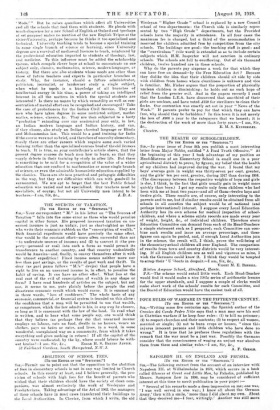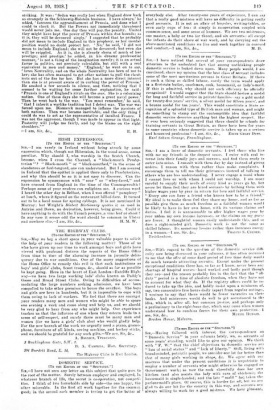NAPOLEON HI. ON ENGLAND AND PRUSSIA. [To THE ED/TOR OF
THE "SPECTATOR."] SIR,—The following extract from the account of an interview with Napoleon III. at Wilhelmsholue in 1870, which occurs in a book called Glances at Great and Little Men, by Paladin, published by Messrs. Sampson .Low in 1890, may be considered of sufficient interest at this time to merit publication in your paper :— "Several of his remarks made a deep impression on me; one was, 'I was well served in one way; I knew all about the German Army,' then with a smile, 'more than I did about. my own. About that they deceived me—I fear, wittingly.' Another was still more striking. It was : 'Sedan was really lost when England drew back so strangely in the Schleswig-Holstein business. I have always,' he added, foreseen the aggrandisement of Prussia, and done what I could to check it. But the Powers not immediately threatened would never join me. One day they will pay.the penalty. United they might have kept the power of Prussia within due bounds; as it is, they will be devoured singly.' I suggested that he probably did not mean to include England in this prophecy, as her insular position would no doubt protect her. 'No,' he said, 'I did not mean to include England; she will not be devoured; but even she will be crippled. As it is, she is already shorn of much of her prestige; and prestige,' he added, in his dreamy professorial manner, 'is not a thing of the imagination merely; it is an actual factor in politics, not precisely calculable, but still with a real equivalent in men and money. 'England,' he went on to says 'loves Neutrality, and on the whole Neutrality has been of use to her; she has often managed to get other nations to pull the chest- nuts out of the fire for her. But she has a more direct interest than she is at present aware of in curbing the power of Prussia.' He smoked a few seconds in silence, and then, noticing that I seemed to be waiting for some further explanation, he said : !Prussia is one of England's rivals on the seas. She is a colonizing nation. One of these days she will become a great naval power.' Then he went back to the war. 'You must remember,' he said, that I inherit a warlike tradition but I detest war. The war was forced upon me. Bismarck managed to inflame the passions of both nations. Then war became inevitable, and the only thing I could do was to act as the representative of insulted France. I was not the aggressor, though I was fnade to appear in that light. Posterity will judge roe fairly, and lay the blame on the right shoulders.'"



































 Previous page
Previous page